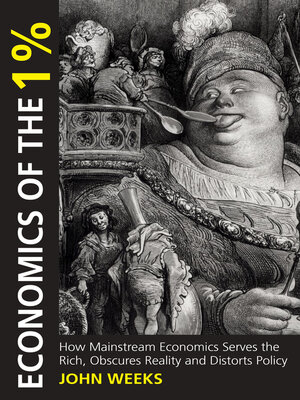
Sign up to save your library
With an OverDrive account, you can save your favorite libraries for at-a-glance information about availability. Find out more about OverDrive accounts.
Find this title in Libby, the library reading app by OverDrive.



Search for a digital library with this title
Title found at these libraries:
| Library Name | Distance |
|---|---|
| Loading... |
How much do economists really know? In most cases, they claim to have profound knowledge but in fact understand little and obscure almost everything. Most people are convinced that economics should be left to the 'experts', when they themselves are perfectly capable of understanding it. This book explains that mainstream economics serves the interests of the rich through its logical inconsistency and unabashedly reactionary conclusions. John F. Weeks exposes the myths of mainstream economics and explains in straightforward language why current policies fail to serve the vast majority of people in the United States, Europe and elsewhere. Their failure to serve the interests of the many results from their devoted service to the few.
|Today's 'doctrine of choice' assures adults that they are competent to make serious personal decisions about healthcare, education and retirement plans. At the same time, most people are convinced that they are so ignorant of economics that they are not capable of holding an informed opinion, and that economic issues must be left to experts. The so-called experts of the mainstream economics profession claim to have profound, inaccessible knowledge; in fact they understand little and obscure almost everything.
Understanding the economy is not simple, but it is no more complicated than understanding the political system sufficiently to cast a vote. In straightforward language, John F. Weeks exposes the myths of mainstream economics and explains why current economic policies fail to serve the vast majority of people in the United States, Europe and elsewhere. He demonstrates that austerity policies have little theoretical basis and achieve nothing but inequality and misery. He goes on to explain how the current deficit and debt 'crises' in the United States and Europe are ideologically manufactured, unnecessary and simple to overcome. Drawing on examples from around the world, this book provides a bold alternative to the economics of the 1%. Their failure to serve the interests of the many results from their devoted service to the few.







